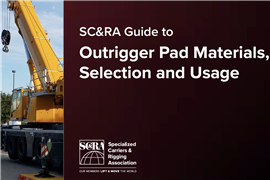No wires
24 April 2008

If a rental company already has a functioning rental software system, the obvious next question is, what other technology can I use to improve some of our key business processes?
Two areas where rental companies have new and potentially powerful options are, first, equipment maintenance/servicing, and second, fleet management in the depot, particularly receiving and delivering equipment.
Improving the efficiency of fleet maintenance and repair is the prime focus of SmartEquip, based in Norwalk, Connecticut. Alexander Schuessler, SmartEquip's CEO and president, tells Access International that he gained an insight into equipment utilisation and costly downtime while helping Caterpillar establish rental service centres in South America in the mid-90s. Efficiency, he says, “was always about getting the right information to the operator, mechanic or service organisation in the field.”
Since then, SmartEquip has developed the e-FleetPro web-based system that acts as a seamless connection between equipment owners (mainly rental companies) and their major suppliers. Working with manufacturers including JLG Industries and Multiquip in the US, SmartEquip allows owners to identify parts (using three-dimensional drawings of each item) and order online. It almost eliminates incorrect ordering and also lets the user see availability.
The next three to six months will also see the introduction of a new safety module for the system. This will flag when parts need replacing and also, ultimately, allow companies to track their preventative maintenance.
“It's the equipment telling you this is what you need to do to me”, says Mr Schuessler, “From a liability exposure perspective, people start to like it, and fleet owners like it because nothing falls through the cracks.”
Integrated tracking
A new feature of the system is an alliance with US company Qualcomm, integrating e-FleetPro with Qualcomm's GlobalTRACS equipment management system. GlobalTRACS is a machine telematics solution that can monitor and transmit wirelessly machine operation and location data using satellite technology. Qualcomm is now working with SmartEquip and rental software specialist Wynne Systems to offer a three-in-one fleet maintenance, tracking and billing solution.
The first equipment rental company to adopt the integrated system is US aerials re-rentals specialist ACME Lift. The company's president, Woody Weld, says “integrating these three technologies increases the uptime, reliability and profitability of my fleet and opens new doors for how I can manage and grow my business.”
For SmartEquip - which is now marketing e-FleetPro to major rental companies in Europe and exhibited at the recent Intermat exhibition in France with Wynne Systems and Qualcomm - the current challenge is to continue to implement its system with its first rental customers, including NationsRents, Volvo Rents and ACME Lift.
Mr Schuessler says that around 25% of NationsRents fleet, in value terms, is now covered by the system; “You start to see real value when you go past 20%.”
What about costs and benefits? Mr Schuessler says that a typical depot with around US$5 million of fleet will have a monthly cost of around $200 to $800. He says returns - it terms of reduced downtime and higher equipment utilisation - can “typically” equate to between $7000 and $15000 each month, per location.
If SmartEquip and its customers are focused on reducing fleet maintenance and repair costs, others are now looking at how RFID (radio frequency identification) tags can be used to improve efficiencies in the depot.
The Stork Group in The Netherlands, for example, is preparing to introduce RFID asset tracking technology into its general rental and scaffolding businesses following successful use of RFID at its Interlas welding rental business.
Interlas has been using RFID for the past three years, and Stork is now expanding it to its entire rental business, which is been consolidated under the 2Rent brand (comprising Interlas, Stork Materieel and Reisiger Verhuur). Reisiger is a well- known scaffolding and general rental business in The Netherlands.
Jan Lulofs, the technical specialist who helped introduce RFID at Interlas and is now leading the 2Rent programme, says tagging has been used both for small bulk items - hoses, cable reels etc - as well as the major rental items, such as welding sets and compressors. Around 80% of the Interlas fleet - 10000 bulk items and 4000 rental machines - has already been tagged.
Major benefit
The big benefit is instant processing of equipment as it leaves and enters a depot, reducing the amount of time spent registering items by hand, identifying what items are missing, and eliminating errors in picking equipment for delivery. Items are scanned with a hand-held reader when they leave on rent, and when they are returned. The information is automatically updated in 2Rent's back-office computer systems, showing what has been rented or returned, when, and what is missing. Unlike barcodes, the RFID scanner doesn't need to be directly placed over the tag - the wireless signal will carry for up to 30 m or more (depending on the type of tag).
The challenge now is to adapt RFID tagging to the Stork Materieel and Reisiger businesses. This will boost the fleet numbers to 100000 bulk items and the same number of rental units. The former Reisiger Verhuur business includes a scaffolding operation, and 2Rent wants this to be included in the programme. Mr Lulofs says there are technical challenges - you can't really drill holes in scaffold tubes, and you need an air gap between the tag and the steel tube - but he says these issues are currently being investigated. Mr Lulofs agrees that the investment is significant, but says the return on investment will be a rapid.
“The system works very simply”, says Mr Lulofs,“There is no need to write down, for example, how many hoses of which type and format you are renting to a certain customer. Because all items have an RFID tag in which not only the group number but also an individual item number is stored, but also all the information about this customer or the rental contract.”
A truckload of bulk items, often coming back from more than one customer, can be scanned by a single reader. “We create order from the chaos, which often exists when large amounts of rented bulk materials return in one shipment”, he says.
Wait and see
Some rental companies are looking on with interest, but holding back on major investments until they are either convinced of the benefits, or until the costs come down.
For example, Brian Sherlock, managing director of Hewden in the UK - which has a large powered access business - told Access International that although it was interested in the potential offered by RFID, it would not be pioneering it in the rental sector; “I don't want our customers to get the mistakes... We're not going to be trailblazing in putting untried technology into place”, he says.
Hewden is currently engaged in a massive IT investment to replace the 50 ‘legacy' IT systems that are currently in use, and Mr Sherlock says the priority is to get this new system in place before looking further at tracking and RFID technology. (The centrepiece of the new IT solution is a rental ERP system from Sweden's Intentia, which is now part of the Lawson group. An exclusive report on Hewden's IT plans will appear in the July-August issue of our sister magazine, International Rental News.)
Mr Sherlock also says cost considerations come into it. Fitting RFID tags to 500000 items would require a significant investment, and he points out that Hewden's owner, Finning in Canada, would be looking for “substantial returns”. He does recognise the potential, however; “RFID will work, there's no doubt, and there are powerful applications.


